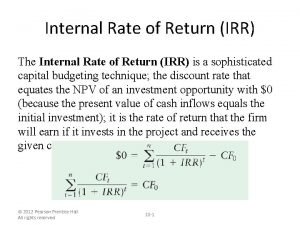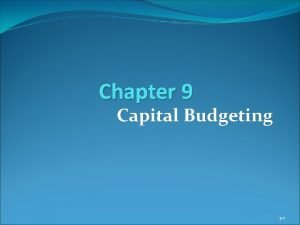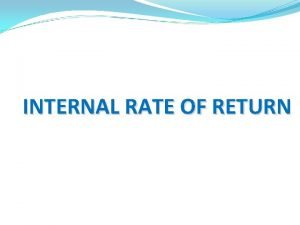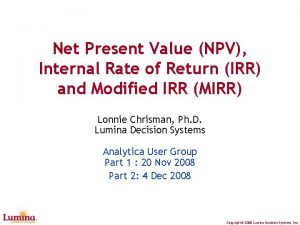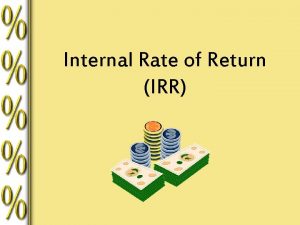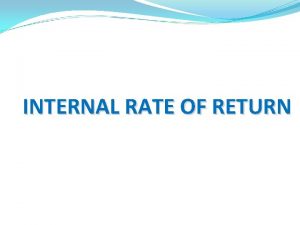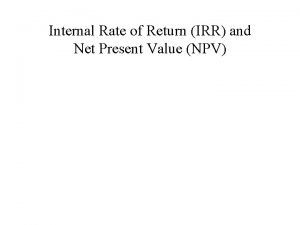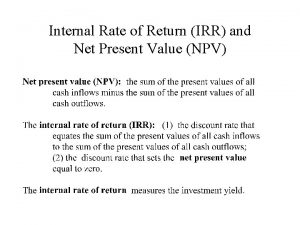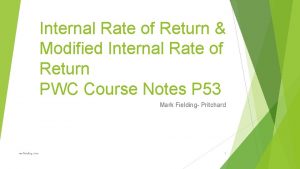Internal Rate of Return IRR Finding IRR is








- Slides: 8

Internal Rate of Return (IRR) Finding IRR is no more difficult now. . .

What is IRR ? • The discount rate often used in capital budgeting that makes the net present value of all cash flows from a particular project equal to zero. • Generally speaking, the higher a project's internal rate of return, the more desirable it is to undertake the project. • As such, IRR can be used to rank several prospective projects a firm is considering. Assuming all other factors are equal among the various projects, the project with the highest IRR would probably be considered the best and undertaken first. • IRR is sometimes referred to as “Economic Rate of Return (ERR)".

FINDING IRR (Trial & Error Method with Interpolation Formula) • A project involves an initial outlay of Rs. 240, 000. The estimated net cash flows for the project are as given: Cash Flows Years (Rs. ) 1. 140, 000 • The company’s required rate of return is 13 percent. 2. 80, 000 3. 60, 000 • Calculate the IRR for the project. Is the project feasible assuming all other factors are equal ? 4. 20, 000 5. 20, 000

IRR can be calculated by Trial & Error Method: (By applying different discount rates) At 13 % discount rate: NPV = - 240, 000+[140, 000/(1. 13)]+[80, 000/(1. 13)2]+[60, 000/(1. 13)3]+[20, 000/(1. 13)4]+[20, 000/(1. 13)5] = - 240, 000 + 123, 894 + 62, 652 + 41, 583 + 12, 266 + 10, 855 = - 240, 000 + 251, 250 = Rs. 11, 250 At 15 % discount rate: NPV = - 240, 000+[140, 000/(1. 15)]+[80, 000/(1. 15)2]+[60, 000/(1. 15)3]+[20, 000/(1. 15)4]+[20, 000/(1. 15)5] = - 240, 000 + 121, 739 + 60, 491 + 39, 450 + 11, 435 + 9, 944 = - 240, 000 + 243, 059 = Rs. 3, 059 At 17 % discount rate: NPV = - 240, 000+[140, 000/(1. 17)]+[80, 000/(1. 17)2]+[60, 000/(1. 17)3]+[20, 000/(1. 17)4]+[20, 000/(1. 17)5] = - 240, 000 + 119, 658 + 58, 441 + 37, 463 + 10, 673 + 9, 122 = - 240, 000 + 235, 357 = Rs. - 4643

INTERPOLATION FORMULA : By using 15% rate we have a positive figure that is greater than zero whereas by using 17% rate we have a negative figure that is lesser than zero. NPV appears to be zero between 15% and 17%, so IRR is somewhere in that range. By using INTERPOLATION Formula, we can find that the IRR is about 15. 79 % IRR = Lower discount Rate + Difference between the two discount rates x (NPV at lower discounted rate / absolute difference between the NPVs of the two discount rates) = = = IRR = 15 + ( 17 – 15 ) x ( 3, 059 / (3, 059 – ( - 4643 )) 15 + 2 x ( 3, 059 / 7, 702 ) 15 + 2 x 0. 3972 15 + 0. 7944 15. 79 % Approx.

Now Applying 15. 79%, We have NPV nearer to Zero : NPV = -240, 000+[140, 000/(1. 1579)]+[80, 000/(1. 1579)2] +[60, 000/(1. 1579)3]+[20, 000/(1. 1579)4]+[20, 000/(1. 1579)5] = - 240, 000 + 120, 909 + 59, 669 + 38, 649 + 11, 126 + 9, 609 = - 240, 000 + 239, 962 NPV = Rs. 38 Nearer to Zero

Project Feasibility : The project is feasible as its Internal Rate of Return (IRR) is greater than the company’s required rate of return, assuming all other factors are equal*. *( If there are two mutually exclusive projects and both have IRR greater than the company’s required rate of return the project with higher NPV will be preferred. In other words, other capital budgeting techniques will be employed. )

Dear Students ! It is hoped that…. . You’d be now able to find out IRR easily. . GOOD LUCK. . . Instructor. . . FIN 622 (Corporate Finance) Virtual University of Pakistan, Lahore.
